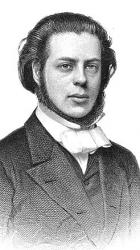Planning worship?
Check out our sister site, ZeteoSearch.org,
for 20+ additional resources related to your search.
- |
User Links
Search Results
Yes, thou art mine, my blessed Lord
Hymnal: The Baptist Hymn and Tune Book, for Public Worship #124.461 (1871)
Yes, thou art mine, my blessed Lord
Yes, thou art mine, my blessed Lord
Author: H. G. G. Hymnal: The Canadian Baptist Hymn Book #358 (1873)
Yes, thou art mine, my blessed Lord
Yes, thou art mine, my blessed Lord
Hymnal: The Baptist Hymn and Tune Book for Public Worship #461 (1873)
Yes, thou art mine, my blessed Lord
H. Grattan Guinness

1835 - 1910 Person Name: H. G. Guiness Author of "Yes, thou art mine, my blessed Lord" Guinness, Henry Grattan, .D.D., son of Capt. John Guinness of Dublin, was born at Mountpellier, near Dublin, in 1835. His work as an undenominational Preacher began in 1856, since which time he has visited most parts of the world in prosecuting his evangelistic labours. He has written numerous hymns and printed them privately to enclose in letters and parcels, and for general distribution. Of these the following were included in The Enlarged London Hymn Book 1873:— (1) "How beautiful the Saviour's feet" (Christ, in Glory); (2) "Thou art my joy, Lord Jesus" (The Glory of Jesus); (3) "Yes, Thou art mine, my blessed Lord" (Jesus our All).
--John Julian, Dictionary of Hymnology, Appendix, Part II (1907)
=====================
Son of Captain John Guiness, Henry was an Irish Protestant preacher and author, and the great evangelist of the Evangelical Awakening; He preached during the Ulster Revival of 1859, drawing thousands to hear him. He offered to join the China Inland Mission founded by James Hudson Taylor in 1865, but took Taylor’s advice and continued his work in London.
In March 1873, Guiness and his wife Fanny started the East London Missionary Training Institute (also called Harley College) at Harley House in Bromley-by-Bow, East End of London, with just six students. The school went on to train 1,330 missionaries for 30 societies of 30 denominations. It was so successful that it needed a larger home, and in 1883, Elizabeth Hulme offered Guinness "Cliff House" near Curbar, Derbyshire. Harley College was renamed Hulme Cliff College; now known as Cliff College, it continues to this day, training and equipping Christians for missions and evangelism.
Guinness founded the Livingstone Inland Mission in 1877, the Congo-Baolo Mission in 1888, and in 1898 began the Regions Beyond Missionary Union.
--http://www.hymntime.com/tch
H. Grattan Guinness


 My Starred Hymns
My Starred Hymns


